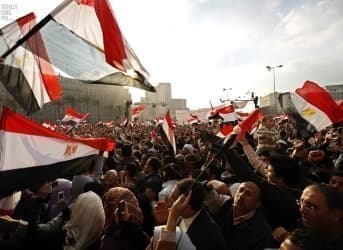The situation in Egypt has not been tenable since the Muslim Brotherhood and President Mohamed Morsi took over, post-revolution, but now that the military has stepped in, ousted Morsi and placed him in detention, foreign investors are celebrating.
No one knows what’s going to happen next, but the general consensus—at least for investors—is that things couldn’t get any worse, only better. (Unless you’re Qatari, but more about that later.)
On 3 July, at the tail end of a 48-hour ultimatum for Morsi to heed protesters’ demands for his resignation or face the consequences, the military launched a coup, forcing Morsi off the stage and issuing arrest warrants for some 250 members of the Muslim Brotherhood for inciting violence and killing protesters.
Morsi and 35 other top Brotherhood figures are now the target of a military investigation and barred from leaving the country. In the meantime, an interim president—Aldy Mansour, head of the Supreme Constitutional Court—has been sworn in, and the military has cut off all communication outlets for the Muslim Brotherhood.
It doesn’t look good for Morsi, especially since Egypt’s new prosecutor general—General Abdel Maquid Mahmoud--is a figure that Morsi personally had deposed in his quest to get rid of any high-level dissent. So he’s got a big axe to grind.
The Muslim Brotherhood has remained defiant, calling for their supporters to take to the streets in protest. The market has remained jubilant—if not a bit shortsighted, because it’s not over yet.
Still, Egypt’s EGX-30 (the country’s main index) rose 7.3% on the news of the coup, with the much-beleaguered Egyptian pound strengthening to 7.0264 to the dollar. It had reached a new low the day before the coup. The cost of insuring Egyptian debt against default also declined.
US crude oil futures rose to 14-month highs as oil bulls saw the chaos in Egypt raise the risk for oil and gas transit via pipeline through the Suez Canal. That risk appears considerably lower now that the military has acted decisively. (While oil production in Egypt is negligible at present, the country controls the Suez Canal.)
But what happens next will determine the security situation, and how long it takes to get a new, functional government in place will determine how long foreign oil and gas investors in Egypt will have to be nervous.
The central venue for protests—Tahrir Square—was quiet until today, when Egyptian security forces clashed with Morsi’s supporters in Cairo and across the country. While the military said it would allow protests if they were not violent, it opened fire today on demonstrators attempting to march on the Republican Guards headquarters in Cairo. Three people were killed.
In the longer term, we should be worried less about threats of Muslim Brotherhood protests—which the military could easily quash if they turned violent—than about reprisals from fringe Islamist groups, which would be doubly empowered should Qatar decide to support them as they have been doing in Syria.
On the political scene, watch the potential rise of Mohamed ElBaradei—former head of the UN’s nuclear watchdog, the International Atomic Energy Agency (IAEA). ElBaradei is an opposition leader who has been waiting for the right opportunity, and he’s already been nominated by the Tamarod movement to become prime minister.
The US, which has been extremely generous with military aid for Egypt—both before the revolution and after—has refrained from calling the military’s 3 July intervention a “coup”. If Washington used the word “coup”, that would effectively make it impossible to continue to provide the Egyptian military with aid, and it’s not sure it wants to close that door just yet. The military itself likes to refer to the move as a “correction” of the 2011 revolution.
Qatar, of course, will call it a “coup” in no uncertain terms—at least in the backrooms. Publicly, it’s congratulated Egypt, but this tiny petro-monarchy which has been throwing cash at the Muslim Brotherhood in Egypt (and more recently Syria) is nervous. Qatar stands to lose the most without the Muslim Brotherhood in power. It was only a couple of weeks ago that Morsi had openly encouraged Islamists in Egypt to take up arms in Syria to fight the Assad regime, certainly at the prompting of its benefactor, Qatar.
By. Charles Kennedy of Oilprice.com


















